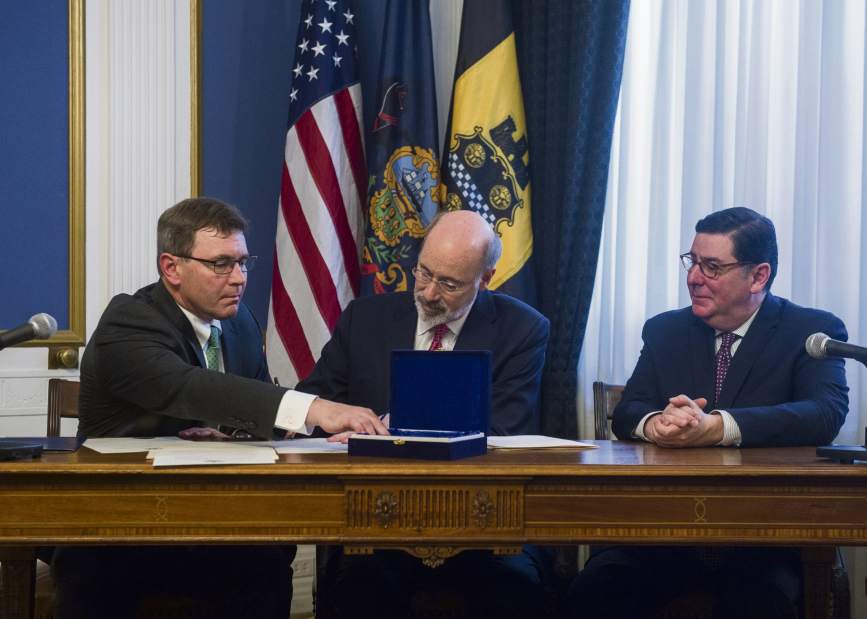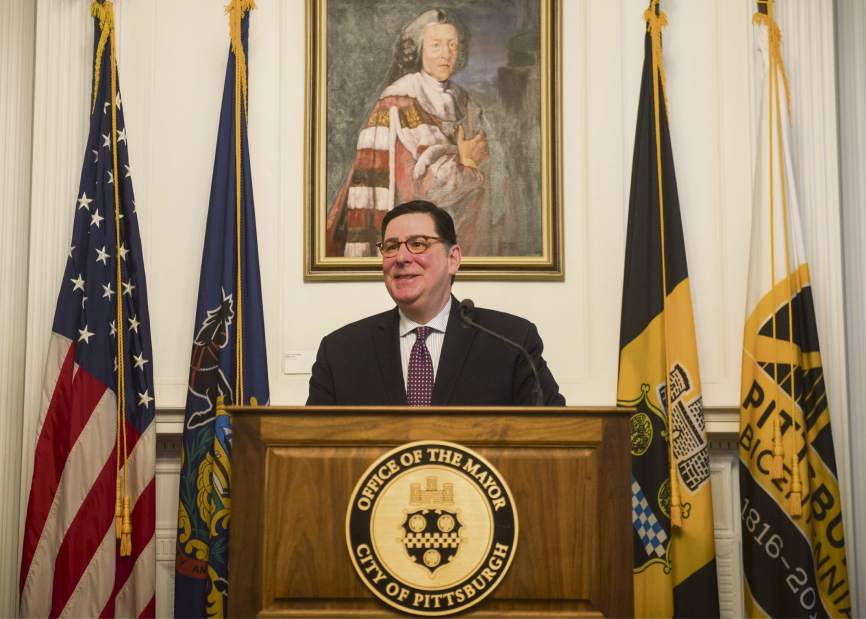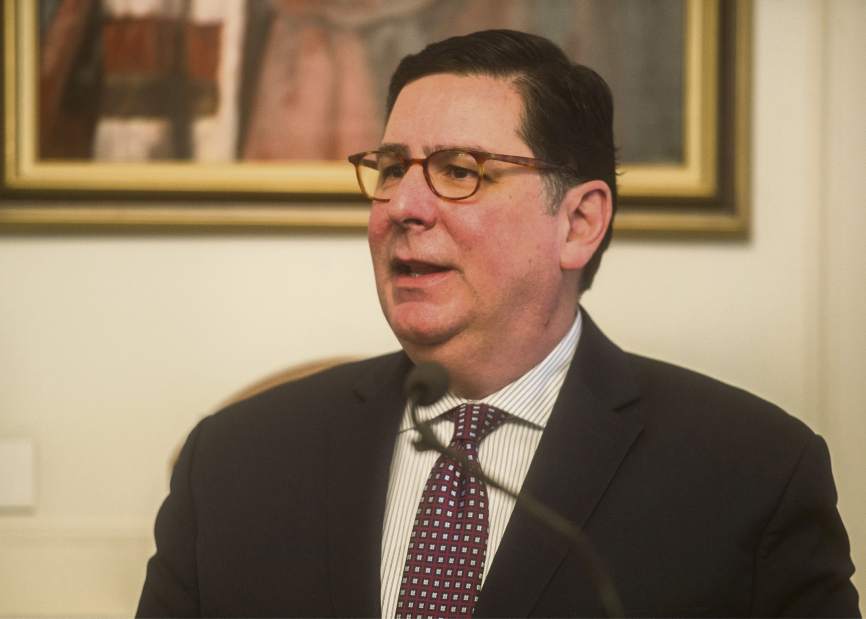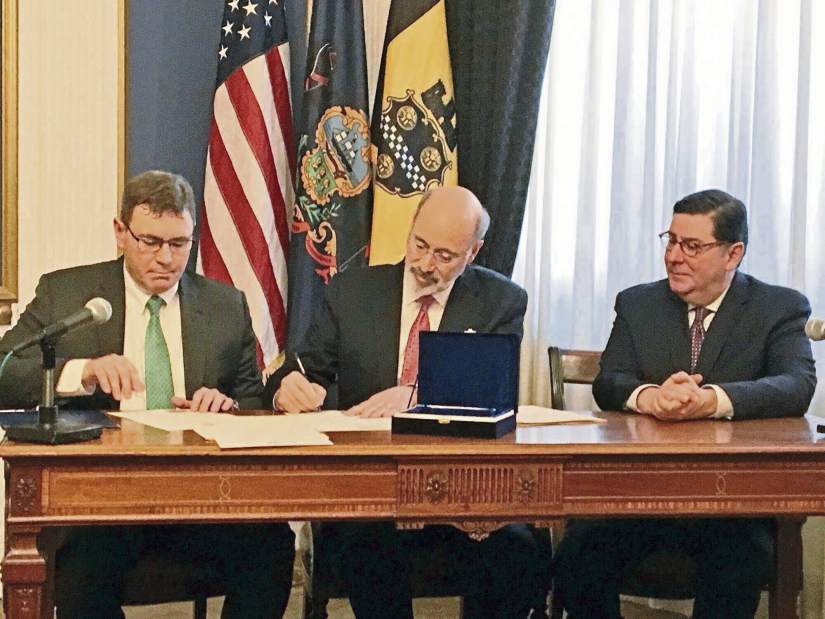Pennsylvania ends financial oversight of Pittsburgh after 14 years
For the first time in 14 years, Pittsburgh is in control of its own finances.
Pennsylvania Secretary of Community and Economic Development Dennis Davin and Gov. Tom Wolf on Monday announced Pittsburgh's release from state financial oversight, officially ending the city's "financially distressed" status.
Davin, who formerly served as Allegheny County's economic development director, said Pittsburgh is in control.
"It's my privilege to inform Gov. Wolf, Mayor Peduto and the citizens of Pittsburgh that this is recision day," Davin announced in a room packed with state and local officials and reporters. "I'm prepared to sign the order releasing the city from Act 47."
Davin's department administers the Municipalities Financial Recovery Act, known as Act 47, which Pittsburgh has operated under since 2004.
Mayor Bill Peduto, one of the few elected officials remaining from when Pittsburgh entered Act 47, said few thought the city could recover from deficits totaling $100 million, debt service payments that consumed 20 percent of annual operating budgets and unfunded employee pension plans.
"We stand here today with a completely different view of the city and it's because of the teamwork of the people that are in this room and the people that are in our neighborhoods that believed and never gave up on this city," Peduto said.
"Pittsburgh is back. The best days of this city are still in front of us."
The announcement had been expected since early this year when Act 47 coordinators and the Intergovernmental Cooperation Authority – Pittsburgh's second oversight team – agreed the city had met all obligations to leave state supervision. Both recommended Pittsburgh's release from oversight.
ICA officials are seeking legislative approval to disband.
"To all of you, and mainly — most importantly — the citizens of Pittsburgh, congratulations on this great achievement," Wolf said. "The Pittsburgh of today is remarkably different than the Pittsburgh of 2004. You have brought tech enterprises and global companies to the streets of Pittsburgh. You transformed a rust belt city... that was a symbol of economic decline into one of the most dynamic examples of innovation in the new economy in the world."
Since Act 47 took effect in 1987, 13 Pennsylvania cities have emerged from "financially distressed" status. The most recent was Altoona in September after five years under state oversight. Former Gov. Ed Rendell declared Pittsburgh's distressed status in December 2003.
As a city councilman in 2004, Peduto voted in favor of the city's first recovery plan, which narrowly passed 5-4. No one from that 2004 council is still on the nine-member body, meaning every current member has served their entire tenures under Act 47's constraints.
Peduto said Pittsburgh no longer has to contend with such limitations. The end of Act 47 also marks the end of employee salary and benefit caps of 2 percent to 3 percent. Employee contracts expire in December.
Peduto promised that employees "who have taken a hit" since 2004 would be compensated, but only within the city's financial means. He said residents would see improvements in streets, parks and playgrounds.
"Now better days are upon us and I look forward to working with not only those who wear the uniforms but all of our employees in making sure that their rewards are there as well," the mayor said. "We're going to be focusing on our roads, on our buildings, on our parks on our playgrounds, on all the different infrastructure that unfortunately for the past 30 years has been left to crumble."
He said the city would hire more police officers for a total compliment of 950 to cut down on overtime and provide more daily patrols and do "minimal hiring" in other departments.
Police and firefighters unions have complained for years about pay constraints.
"The FOP is glad that the city has finally been released from Act 47 and we look forward to working with the city in our future contract negotiations," said Robert Swartzwelder, president of Fraternal Order of Police Fort Pitt Lodge No. 1.
Gordon Mann of PFM Group Consulting in Philadelphia, one of the Act 47 coordinators, said the city must live within its means to avoid future oversight.
"You need to make sure that the things that you buy are things you can pay for today," he said. "Then we hope that the spirit of cooperation that we heard today, all those sort of era of good feelings, continues because five months from now the mayor is going to be sitting with public sector unions and they're going to be negotiating."
Bob Bauder is a Tribune-Review staff writer. Reach him at 412-765-2312, bbauder@tribweb.com or on Twitter @bobbauder.









